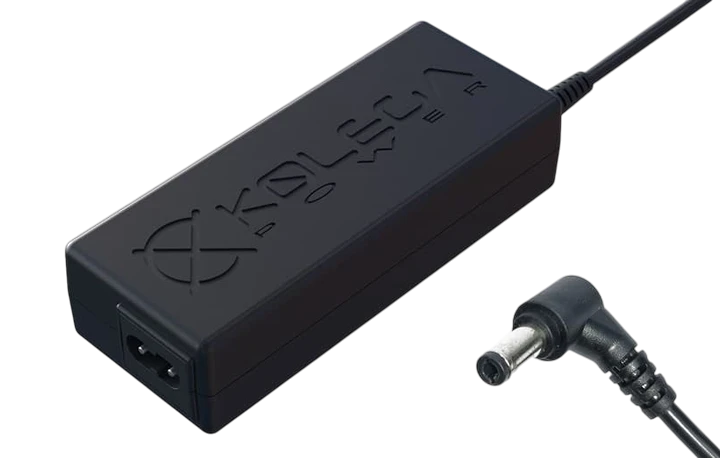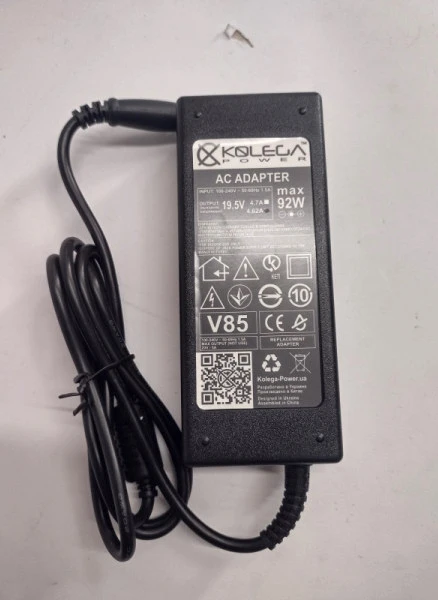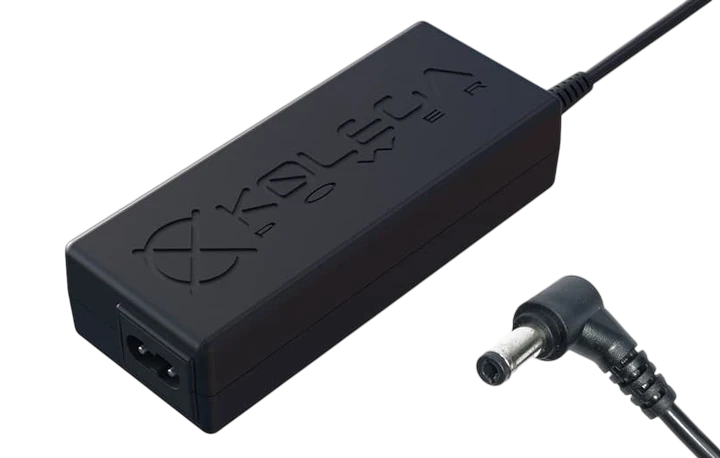Finding the correct power adapter for your laptop is crucial for its longevity and performance. An ill-suited adapter can lead to slow charging, battery degradation, or even permanent damage to your device. This guide will walk you through the essential steps and considerations for choosing the perfect power adapter.

photo by https://kolega-power.ua
1. Identify Your Laptop's Power Requirements
This is the most critical step. You need to know the specific voltage (V), amperage (A), and wattage (W) your laptop requires. You can find this information in several places:
- On your old (original) power adapter: Look for a label that states "Output" followed by the voltage and amperage (e.g., "19.5V - 3.33A").
- On the laptop itself: Check the sticker on the bottom or near the charging port. It will usually specify "Input" or "DC Input" with the required voltage and amperage.
- In your laptop's manual: The technical specifications section will detail the power requirements.
- On the manufacturer's website: Look up your laptop model's specifications.
Once you find these details, pay close attention to:
- Voltage (V): This must exactly match your laptop's requirement. If your laptop needs 19V, you must use a 19V adapter. Using a higher voltage (e.g., 20V for a 19V laptop) can severely damage your device. Using a lower voltage might prevent the laptop from charging or even turning on.
- Amperage (A): The adapter's amperage must be equal to or greater than your laptop's requirement. For instance, if your laptop needs 3.42A, an adapter providing 3.42A, 4.5A, or 4.74A is suitable. A higher amperage simply means the adapter has more "headroom" and won't work at its maximum capacity, potentially extending its lifespan. Using an adapter with lower amperage can lead to slow charging, unstable operation, or overheating of the adapter.
- Wattage (W): This is calculated by multiplying voltage by amperage (W = V x A). The adapter's wattage should be equal to or greater than your laptop's required wattage. If your laptop needs 65W, a 65W or 90W adapter will work.
2. Check the Connector Type and Size
Even if the electrical specifications are perfect, the adapter won't work if the plug doesn't fit your laptop's charging port. Laptop connectors come in various shapes and sizes:
- Common Round Connectors: Most laptops use round barrel connectors. For these, you need to know both the outer diameter (OD) and inner diameter (ID), usually measured in millimeters (e.g., 5.5x2.5mm, 4.0x1.7mm). Some also have a central pin.
- Unique Connectors: Some brands use proprietary connectors, such as the rectangular "Slim Tip" for Lenovo or the "Smart Pin" for HP (7.4x5.0mm with a central pin). Apple laptops typically use USB-C or MagSafe connectors.
- USB-C (with Power Delivery): Increasingly common on modern laptops, USB-C ports with Power Delivery (PD) support offer a universal and reversible connection. If your laptop charges via USB-C, ensure the adapter also has a USB-C output with PD support.
Tip: Visually compare the connector on your old adapter or measure the laptop's port with a caliper if you're unsure.

photo by https://kolega-power.ua
3. Consider Adapter Type: Original vs. Universal
- Original Equipment Manufacturer (OEM) Adapters: These are made by your laptop's manufacturer (e.g., Dell, HP, Acer). They offer guaranteed compatibility and optimal performance but are often more expensive.
- Compatible/Aftermarket Adapters: These are made by third-party manufacturers. They can be more affordable but vary widely in quality. If choosing an aftermarket adapter, opt for reputable brands known for quality control and safety certifications. Brands like Kolega Power (active in the Ukrainian market) are examples of compatible power supply manufacturers.
- Universal Power Adapters: These come with a main power brick and a set of interchangeable tips to fit various laptop models. They are convenient if you have multiple laptops or if you're replacing a lost adapter.
- Manual Voltage Switch: Older universal adapters might have a manual switch for voltage. ALWAYS ensure you set the correct voltage before connecting it to your laptop to avoid damage.
- USB-C PD Universal Adapters: Modern universal adapters, especially those leveraging GaN (Gallium Nitride) technology, are compact, powerful, and often feature USB-C PD. These automatically negotiate the correct voltage and current with your laptop, making them highly convenient and safe.
4. Prioritize Quality and Safety Features
A cheap, low-quality power adapter can be a fire hazard and damage your laptop. Look for adapters with these safety features:
- Over-Voltage Protection (OVP): Protects against excessive voltage.
- Over-Current Protection (OCP): Prevents damage from excessive current.
- Short-Circuit Protection (SCP): Automatically shuts off power in case of a short circuit.
- Over-Temperature Protection (OTP): Prevents overheating of the adapter.
- Certifications: Look for certifications like CE, FCC, RoHS, or UL, which indicate compliance with safety standards.
5. Check Polarity (Rare but Important)
For round barrel connectors, the polarity (whether the center pin is positive (+) or negative (-)) is usually indicated by a small diagram on the adapter and laptop. Most laptops use a center-positive configuration, but it's good practice to verify, especially for older or less common devices.
Quick Checklist Before You Buy:
- Voltage (V): Does it exactly match your laptop's requirement?
- Amperage (A) / Wattage (W): Is it equal to or greater than your laptop's requirement?
- Connector Type: Does the plug perfectly fit your laptop's charging port?
- Quality: Is it from a reputable brand with safety features?
By following these guidelines, you can confidently choose a power adapter that will keep your laptop charged efficiently and safely for years to come.



